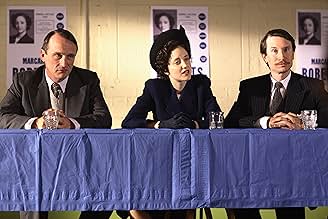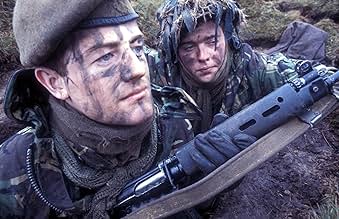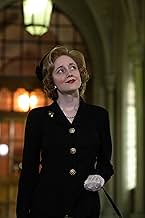Füge eine Handlung in deiner Sprache hinzuOn April 2, 1982, Britain went to war to regain the Falkland Islands. This movie is a gripping account of how Prime Minister Rt Hon Margaret Thatcher MP's government handled the biggest cris... Alles lesenOn April 2, 1982, Britain went to war to regain the Falkland Islands. This movie is a gripping account of how Prime Minister Rt Hon Margaret Thatcher MP's government handled the biggest crisis in British foreign affairs since the Suez Canal. It tells the story of how Argentina, a... Alles lesenOn April 2, 1982, Britain went to war to regain the Falkland Islands. This movie is a gripping account of how Prime Minister Rt Hon Margaret Thatcher MP's government handled the biggest crisis in British foreign affairs since the Suez Canal. It tells the story of how Argentina, an ally of the British, fought the Conservative government and invaded the Falklands. This ... Alles lesen
Empfohlene Bewertungen
Patricia Hodge was wonderful as "Maggie" and being a big fan of British TV and films many other faces were quite familiar. I was quite struck by how Rt Hon Francis Pym and members of the labor party has so quickly forgotten the lessons and cost of appeasement! At one point I would've loved to hear Mrs. Thatcher respond to those questioning the rightness of fighting over "some small rocks and a handful of people" with "If 1,800 British subjects are not worth fighting for, please tell me, exactly, what is the minimum number that IS? 5,000? 10,000? 100,000? 1,000,000?"
Besides having been there to listen to the daily coverage, I've watch a number of documentaries and read a number of books on the battle including the memoirs of the Battle Group Commander Adm. Sandy Woodward. Everything in this movie tracks closely with everything else that I know about the time, the situation and the battles. The one thing I would take exception with, frankly comes as no surprise to me. The all too familiar anti-American jealousy/prejudice that is very common in British programming. One need only contrast the carefully chosen flattering selection of Patricia Hodge to play Margaret Thatcher with the perhaps equally carefully chosen unflattering selection of Bob Sherman to play President Reagan. Not only did he bear no resemblance beyond an American accent, he played Reagan as a bumbling fool who couldn't even remember the name of the islands rather than the strong leader who helped bring down the Berlin wall and with it the Soviet Union. The most pathetic moment was portraying Reagan as having trouble deciding which tie to wear while discussing the issues. That was simply petty and mean.
Lost in all of this is the reality that the British government had allowed this crisis to develop through apathy, neglect and an unwillingness to sacrifice. The Argentine government was emboldened to act due to the steady decline of the power of the Royal Navy and in fact, had they the patience to simply wait a year or two more, the RN's only two carriers would've been decommissioned and Britain would've been forced to accept the take over of the islands. As it is, the losses of British shipping, especially that of the Sheffield and Coventry were reportedly contributed to a decision to cut costs on construction by reducing the length of the ships eliminating the space required for the anti-missile system they were originally designed to carry. This would seem to be a major deficiency for a ship supposedly designed for radar picket duty to detect and defend incoming missile attack! Oddly enough, another documentary I recently watched about the Eurofighter project disclosed similarly dangerous cost cutting which only proves that even those lessons written in blood are too soon forgotten!
I'm sorry to disappoint any die hard anti-Thatcher or socialist critics reading this, but this play depicts what happened in those meetings. Mrs Thatcher didn't rub her hands with glee at the prospect of war after all, neither did the Conservative government ritually dine on a feast of babies before holding meetings and not all political drama has to have a strong left wing edge. And if you still think this play is a whitewash, then can I direct you to the primary source material this play was written from. Patricia Hodge is great in the role of Mrs Thatcher, and her put down of Tony Benn (again, it's a real quote, that dialogue did happen) at the end is brilliantly realised.
Britain won the little but costly war and Prime Minister Margaret Thatcher emerged he winner. She was a hard charger and much admired for it. Of course if the victory had been the other way round, a lot of people would be dead for little reason and she would be thrashed. As it was, there was no stopping her in her determination. One American consultant muses, "I wish there were more like her. You always know exactly where you stand." "In the corner," replies another.
There is very little footage of the war itself. The script seems to jump from the landings of the British SAS to the surrender of the Argentinian soldiers. But that's okay because this is, after all, a play, not a big budget feature film. Besides, the general outline of the war's progress is already familiar to some viewers, although by no means all of them. Anyone interested in the engagements should be directed to the concise documentary, "20th-Century battlefields: 1982 The Falkland Islands War." It can be viewed free on YouTube.
The script has sufficient continuity so that we can follow events as they unfold, even though we're confined mostly to a few rooms and a handful of other sets. As Thatcher, Patricia Hodge is quite good, if lacking in heft. And there isn't a dull bulb among the supporting actors. There are a few moments of humor. Someone tells the Defence Minister, Clive Merrison, that this is the first time a British fleet has set sail for an attack since Suez. Merrison replies slowly and deliberately. "Can we keep Suez out of this conversation? Those are two little words that -- irk." The well-meaning Americans provide some ludic relief as well. Thatcher invites the American consultants to dinner and takes aside Alexander Haig, the Defense Secretary before they sit down. Thatcher shows him a large painting of two men -- the Duke of Wellington and Lord Nelson, saying that they were two heroes who put an end to willful aggression by dictators. "I thought you might want to look at them during dinner." Haig mutters into his drink, "Gee, thanks."
The role of the Americans is that of a nation full of good will, anxious to avoid bloodshed, and apparently oblivious to the fact that Argentina is under the thumb of a brutal military junta who has invaded the Falklands -- which they (still) insist on calling Las Malvinas -- in order to distract the population from the catastrophic conditions at home. Haig is a good guy, although ineffective. President Reagan's attitude was that "both of them are our friends," even after the British ambassador reminds him that Britain didn't hesitate for a moment to aid in the extraction of 52 hostages after the embassy takeover in Iran.
Reagan apparently listened less to Haig than to his UN ambassador, Jeanne Kirkpatrick. Kirkpatrick was a pragmatic and ardent anti-communist. As Wikipedia puts it, "She was known for the "Kirkpatrick Doctrine", which advocated supporting authoritarian regimes around the world if they went along with Washington's aims. She believed that they could be led into democracy by example." Argentina fell into that category.
Reagan himself thought it a minor matter, calling them "bleak little islands" and never quite remembering their name. After the British victory, Reagan called on Thatcher to be "magnanimous," and Thatcher blew him off. By the time the war had begun, however, the US came around and placed an embargo on shipments to Argentina and agreed to supply Britain with whatever materiél it required.
Whatever else this fine program does, it illustrates the way that democracy is supposed to work, and of course it will be informative to those whose memories don't extend very far into history.
Originally written by Ian Curteis shortly after the war ended but the BBC declined to produce it, officially because it wasn't good enough, but widely believed to be because it was too pro-Conservative just before a General Election in the UK. Watching it now it's even harder to believe that it wasn't good enough to make years ago.
Telling the story of the British politics immediately before and during the conflict Patricia Hodge is brilliant in her role as Mrs. Thatcher. So scarily like her that during the recreated news clips it's hard to remember which one is the actress. Although some of the other lead characters look and sound nothing like their alter-egos, they still manage to recreate the right atmosphere.
Deliberately supposed to show the conflict from `our side' I'm not sure if the emotional side of Margaret Thatcher isn't over played slightly.
The acting is of the highest order...... you truly believe that these are the people, and this is how they behaved (Hodges Thatcher is remarkable). Add this to a plot that fiction could never match, and you are likely to be hooked from the opening scene.
With caution, I would also suggest that this drama does bring history to the viewer, in a way the BBC seems to constantly excel at. Much of the script is taken from hansard (parliamentary transcripts), contemporary diaries, and news reports..... the drama didn't need to be invented.
One or two earlier reviewers felt that it was a historical distortion, however, in my opinion, they are still grinding axes.
So yes.... do bear in mind that in the years running up to the crisis, perhaps the Brits took their eye off the Falklands (though this is outside the remit of this play).
Also yes.... there was the major incident 'sinking of the Belgrano', that in real life, was controversial. However, I believe the play portrayed the genuine view of the decision makers: 'destroy it, before it destroys us'.... a view held by the majority of the UK population (I would suggest).
As for the suggestion that 'Thatcher would never have ranted against Argentina to the US', I find beyond belief. That's exactly how she behaved, and she was famous for it AND by the way, it is portrayed marvelously in this play, with the joy of historical posturing so well done.
If you get the chance...... watch it!
Wusstest du schon
- WissenswertesOriginally commissioned by the BBC in 1987, but wasn't filmed until 2002.
- PatzerAdmiral Lewin is wearing the South Atlantic Medal. Before the war had even begun.
- Zitate
[in a War Cabinet meeting]
Margaret Thatcher: Do we send those ships? Do we still have the will to fight aggression by force of arms, even halfway across the world, even at huge risk of world opinion turning against us? Because if we don't have it any more, for God's sake say so now and pull out before we start. It may be we *are* going to war. People *will* get killed. Innocent people. Young soldiers, many of whom won't even know what it is we are fighting for. Are we really prepared to do that? Do we still believe what we certainly believed in in 1940? Or is that now just the romance of history, nothing to do with the cold reality of Britain in 1982, part of a nation that has, actually, quietly died, as Greece died, as Spain died? Because if in our hearts we really believe that Britain is dead, then it would be a crime of the direst and blackest sort to send those men to fight, a crime of which the country would very soon find us guilty, because their hearts won't be in it. The first death will light the fuse that will blow us sky-high and clean out of office at the next election. Now, do we send the signal or not?
[each cabinet minister, with some hesitation, says "yes"]
- Crazy CreditsThe first names of Nicholas Ridley and Jeanne Kirkpatrick were mis-spelled as Nicolas and Jeane in the closing credits.
- VerbindungenFeatured in When TV Goes to War (2011)

































